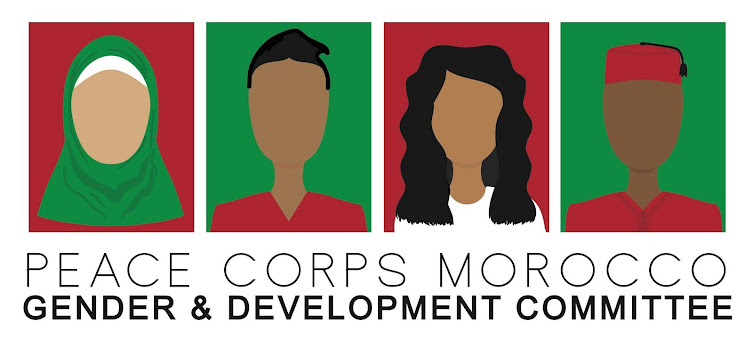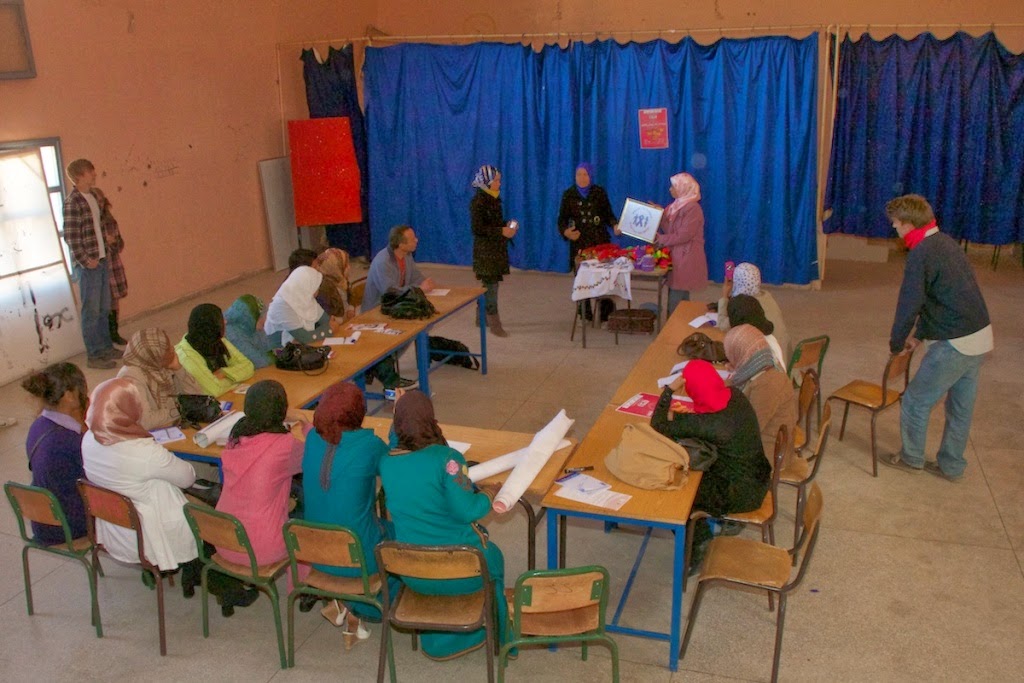By Thomas Duncan, 2013-2015 Stage
This winter we organized "Everybody Has a Voice"
workshops for women’s associations from the provinces of Ouarzazate, Zagoura,
and Tinghir.
They were huge successes. 15 different communities
throughout the three provinces were represented, with a total of 57
participants, 50 of them women.
The workshops aimed to give women a forum to discuss their
issues, collaborate on how to move forward together and provide professional
experience, networking opportunities, and communication skills development. We
also wanted to give women tools to do further collaborative work on their own.
To prepare for the workshop, we asked each participating association to create an artistic representation of an issue/issues facing women in their particular community. While the assignment was abstract, the women responded with some really powerful artwork
about really tough issues.
For many of the women, this was their first professional
event. We discussed how feeling nervous was natural, but that everyone was in
it together and that they could help each other, encourage each other to speak
out and to offer ideas. Most of the women said that in their communities they
do not have a place to discuss their issues, and often feel ignored. This meant
that encouraging them to really discuss tough issues was actually a bit of a challenge.
Dar America from the U.S. Consulate funded the workshops,
and we collaborated with CorpsAFrica on the framework. A number of local associations contributed as
well. Ouarzazate eNews, a youth journalism organization, covered all of the
events. The added elements of journalists and photographers—snapping photos
during the workshops and interviewing some of the women—really provided
participants with a sense of importance and professionalism.
Individual event highlights:
Zagoura Province:
 The women said they never considered before to gather with similar associations
to work together or share ideas. Through conversation they discovered they all
face the same issues, but on different levels, and can really use each other's
help and perspectives. They said that as women in rural Morocco they feel
ignored and have no place to discuss their issues. Other topics discussed included
poor health care and having to do all the work for their families in harsh natural
conditions, as well as violence against women.
The women said they never considered before to gather with similar associations
to work together or share ideas. Through conversation they discovered they all
face the same issues, but on different levels, and can really use each other's
help and perspectives. They said that as women in rural Morocco they feel
ignored and have no place to discuss their issues. Other topics discussed included
poor health care and having to do all the work for their families in harsh natural
conditions, as well as violence against women.
Zagoura Province:
 The women said they never considered before to gather with similar associations
to work together or share ideas. Through conversation they discovered they all
face the same issues, but on different levels, and can really use each other's
help and perspectives. They said that as women in rural Morocco they feel
ignored and have no place to discuss their issues. Other topics discussed included
poor health care and having to do all the work for their families in harsh natural
conditions, as well as violence against women.
The women said they never considered before to gather with similar associations
to work together or share ideas. Through conversation they discovered they all
face the same issues, but on different levels, and can really use each other's
help and perspectives. They said that as women in rural Morocco they feel
ignored and have no place to discuss their issues. Other topics discussed included
poor health care and having to do all the work for their families in harsh natural
conditions, as well as violence against women.
Artistic Representations included paintings showing women
doing all the farm work, having to trudge through sand dunes to carry harvests,
and falling ill with no access to medical care. Youth from Zagoura put on a
play about violence against women and families.
Ouarzazate Province:
Ouarzazate is home to a well-established women's association called Oxygene. Oxygene was able to collaborate with very rural and relatively young associations, such as the women from Ouiselsat where women weave carpets for a living and often feel taken advantage of by the vendors (all male) who buy their carpets and sell them at huge markups, with the women seeing none of those profits. The ability to learn how to articulate this issue was a big benefit to a number of the associations. The women from Taznakht made a carpet especially for this workshop, depicting a woman with her hands up, as if saying "I've had enough of all that I have to deal with!"
Tinghir Province:
Most of the women in Tinghir said they have no place in their communities to discuss their issues and that they had never been to any formal professional event like this before. One woman said she was so nervous/excited she could not keep her legs from shaking!
Artistic representations included a painting from an
association in Mcissy, depicting a pregnant woman who had been abandoned by her
husband, left to do all of the work providing income for and taking care of her
other children.
The organizing committee of these workshops intends to follow up with these associations to see if and how they are using each other’s help. We hope to offer these workshops again next year and extend that work, bringing all of the women from the individual provinces together for a conference.
The organizing committee of these workshops intends to follow up with these associations to see if and how they are using each other’s help. We hope to offer these workshops again next year and extend that work, bringing all of the women from the individual provinces together for a conference.




